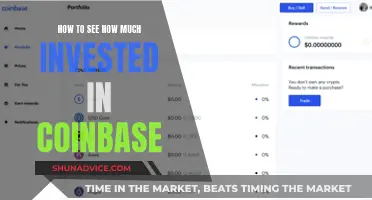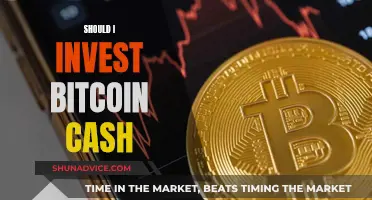
With thousands of cryptocurrencies on the market, it can be challenging to decide which ones to invest in. Here are some factors to consider when choosing cryptocurrencies to invest in for the future:
- Market Capitalization: Consider investing in cryptocurrencies with larger market capitalizations, as they tend to be more established and less volatile than smaller coins.
- Liquidity: Look for cryptocurrencies with high liquidity, as they are easier to buy and sell and are less susceptible to price manipulation.
- Usability and Security: Choose cryptocurrencies with fast transaction speeds and secure blockchain technology to protect your investment.
- Adoption: Opt for cryptocurrencies with a high level of adoption, as they have better liquidity and are more likely to be used for regular purchases and bank transfers.
- Fundamentals: Invest in cryptocurrencies with strong fundamentals, such as a well-developed ecosystem, a dedicated community, and a clear use case.
While there are many options available, here are some of the most popular cryptocurrencies that you may consider for investment in the future:
- Bitcoin (BTC): The first and most well-known cryptocurrency, Bitcoin has the largest market capitalization and is widely accepted by businesses.
- Ethereum (ETH): Ethereum introduced smart contracts and decentralized applications, making it the second-largest cryptocurrency by market cap.
- Binance Coin (BNB): BNB is the native token of the Binance exchange, offering benefits such as lower fees and exclusive access to users.
- Tether (USDT): Tether is a stablecoin backed by fiat currencies, making it less volatile than other cryptocurrencies.
- Solana (SOL): Solana is a high-performance blockchain platform for smart contracts, known for its fast transaction speeds and low costs.
- Cardano (ADA): Cardano is a decentralized blockchain project that supports peer-to-peer transactions and smart contracts, offering energy efficiency and scalability.
- Dogecoin (DOGE): Dogecoin is a meme coin that gained popularity due to its community and high-profile supporters like Elon Musk.
- Ripple (XRP): Ripple is a global payments network for institutional use, offering faster, cheaper, and more secure transactions than traditional systems.
- Uniswap (UNI): Uniswap is a decentralized cryptocurrency exchange that introduced the automated market maker model, allowing for direct token swaps on the blockchain.
- Toncoin (TON): Toncoin is a blockchain project continuing the development of the Telegram messenger's blockchain platform, focusing on scalability and smart contracts.
| Characteristics | Values |
|---|---|
| Oldest and most popular | Bitcoin |
| First to introduce smart contract functionality | Ethereum |
| Native token of Binance | BNB |
| One of the fastest blockchains | Solana |
| Focused on creating payment solutions for banks and financial institutions | XRP |
| One of the most popular tokens among investors | Dogecoin |
| A Layer-0 protocol for connecting and securing several blockchains | Polkadot |
| Decentralized blockchain project designed as an open-source platform | Cardano |
| A 2020-launched ethereum network competitor | Avalanche |
| Uses a decentralized oracle network to facilitate secure interactions between blockchains and external data feeds | Chainlink |
| A blockchain built for mass adoption, with use cases that include finance, nonfungible tokens, payment processing and gaming | Solana |
| A meme coin whose primary claim to fame is that Elon Musk likes it | Dogecoin |
What You'll Learn
- Bitcoin: the oldest and most popular crypto token
- Ethereum: the leading blockchain for smart contracts
- Binance Coin: the native token of Binance, the world's largest crypto exchange
- Solana: a blockchain with a unique architecture that allows it to process thousands of transactions per second
- Toncoin: a blockchain closely integrated with the Telegram messenger

Bitcoin: the oldest and most popular crypto token
Bitcoin is the oldest and most popular cryptocurrency token. It was created in 2009 by Satoshi Nakamoto and is the original cryptocurrency. It runs on a blockchain, or a ledger logging transactions distributed across a network of thousands of computers. Bitcoin is kept secure by the fact that additions to the distributed ledgers must be verified by solving a cryptographic puzzle, a process called proof of work.
Bitcoin's price has skyrocketed as it has become a household name. In May 2016, you could buy one bitcoin for about $500. As of August 27, 2024, a single bitcoin is worth $63,065. This price increase has been driven by Bitcoin's status as a household name and its limited supply. There will only ever be 21 million bitcoins, and currently, around 19.75 million are in circulation.
Bitcoin is also the most widely used decentralised ledger currency and has the highest market capitalisation of any cryptocurrency. As of September 2024, it has a market capitalisation of $1.25 trillion. This makes it a relatively stable investment compared to some newer crypto tokens. However, it also means that Bitcoin rarely deviates from general market trends and conditions.
Investing in Bitcoin does come with some drawbacks. Firstly, Bitcoin operates on proof of work, which consumes a lot of electricity and requires excessive time to confirm transactions. Additionally, as the most dominant player in the crypto market, Bitcoin faces competition from thousands of other cryptocurrencies, many of which aim to improve upon Bitcoin's technology.
Despite these drawbacks, Bitcoin's status as the oldest and most popular cryptocurrency token makes it a relatively stable investment in the crypto market.
Bitcoin Investors: The Money Made and Lessons Learned
You may want to see also

Ethereum: the leading blockchain for smart contracts
Ethereum is a blockchain that supports smart contracts, enabling more complex use cases such as decentralised lending protocols and non-fungible tokens. The project was founded by Vitalik Buterin, who published the Ethereum whitepaper in late 2013. The Ethereum blockchain launched in July 2015.
Ethereum was one of the first altcoins and is now the second-largest cryptocurrency after Bitcoin in terms of market capitalisation. It was the first to introduce smart contract functionality, allowing developers to create and automate several key features. Ethereum is also built to provide a platform for decentralised applications and finance, becoming the leading blockchain to service this need.
The Ethereum blockchain now supports over 4,400 decentralised applications and developer tools. The native cryptocurrency of the Ethereum network is Ether. In 2023, Ethereum transitioned from a proof-of-work consensus mechanism to a less energy-intensive, proof-of-stake transaction system, making it a greener investment than Bitcoin.
Ethereum's proof-of-stake consensus mechanism has made the blockchain highly efficient, and future upgrades are focused on increasing transaction speed and further improving security protocols. However, Ethereum sometimes experiences high network traffic that can slow transactions down. It also has high transaction costs that can be higher than the value of the transaction itself.
Despite this, Ethereum has a strong market dominance in the DeFi and dApp space, and its native token, Ether, is far ahead of other competitors.
Potcoin Investment: A Beginner's Guide to Getting Started
You may want to see also

Binance Coin: the native token of Binance, the world's largest crypto exchange
Binance Coin (BNB) is the native token of Binance, the world's largest cryptocurrency exchange in terms of daily trading volume. Founded in 2017 by Changpeng Zhao, a developer who had previously created high-frequency trading software, Binance has solidified its position as the top crypto exchange, with a daily trading volume of over USD 36 billion by the beginning of 2021.
Binance Coin was initially launched in 2017 as an ERC-20 token on the Ethereum blockchain. It was created to provide special benefits to users of the Binance exchange, such as lower fees, exclusive access to initial coin offerings, and cashback. Over time, BNB has expanded beyond its role as a utility token on the Binance platform, and it can now be used for trading, payment processing, or booking travel arrangements. It can also be traded or exchanged for other cryptocurrencies such as Ethereum or Bitcoin.
The success of Binance Coin is closely tied to the performance of the Binance exchange. Binance has faced regulatory challenges and has been banned from operating in certain countries, including the United Kingdom, Japan, and Germany. Despite these setbacks, Binance remains a popular choice among crypto investors and traders due to its low costs and high throughput.
As of August 27, 2024, Binance Coin had a market capitalization of $81.11 billion, with a price of around $555.70. The token's price has experienced significant growth since its launch, starting at just $0.10 in 2017 and rising to around $560 by late April 2024, representing a gain of over 560,000%.
Investing in cryptocurrencies, including Binance Coin, comes with risks due to the volatile nature of the market. It is essential for investors to conduct thorough research and carefully consider their investment goals and risk tolerance before deciding to invest in cryptocurrencies.
Strategies for Investing in Multicoin Capital
You may want to see also

Solana: a blockchain with a unique architecture that allows it to process thousands of transactions per second
Solana: A Blockchain with a Unique Architecture
Solana is a decentralised blockchain platform that prioritises scalability. It is one of the fastest blockchains available, with a transaction speed of almost 65,000 per second. This is achieved through the unique Proof of History consensus mechanism, which allows nodes to synchronise time across the network.
Solana's Architecture
Solana is a public, open-source blockchain that supports smart contracts, Non-Fungible Tokens (NFTs), and a variety of decentralised applications (dApps). It was developed by Anatoly Yakovenko and Raj Gokal in 2017.
Solana employs a hybrid protocol of Proof-of-Stake (PoS) and Proof-of-History (PoH), a concept developed by its creators.
Proof of Stake
This is a consensus mechanism where crypto holders pledge or 'stake' their crypto holdings to a validator. These validators are then chosen to append the next block of transactions depending on factors such as how large their stake is or how long they have staked for.
Proof of History
Proof of History is a new concept that focuses on proving that a message occurred at a specific time before and after an action. It uses a cryptographic clock to verify the time of each transaction on the chain. It is a high-frequency verifiable delay function (VDF) that produces a unique output that can be publicly verified.
The combination of PoH and PoS achieves impressive results. Solana boasts transaction speeds exceeding 50,000 per second, significantly faster than Ethereum. This speed and efficiency open doors for real-world applications like high-frequency trading and micropayments.
Other Features
Solana implements several other features to improve its performance, including:
- Tower BFT: A system that improves network responsiveness by allowing validators to vote on the state of the ledger and reference previous votes, speeding up validation.
- Turbine: A block-propagation technique that increases bandwidth and capacity by breaking down and sending data in packets to different validators.
- Gulf Stream: A strategy that forwards transactions to validators before the current block of transactions is finished, reducing confirmation time.
- Sealevel: A feature that allows Solana to execute smart contracts in parallel, running thousands of smart contracts simultaneously without impacting network performance.
- Pipelining: A transaction processing unit that assigns a stream of input data to different hardware, improving block validation times.
- Cloudbreak: A data structure protocol for reading and writing across the network concurrently.
- Archivers: A network of nodes used for data storage, offloading data from validators.
Solana's unique architecture and innovative features make it one of the most efficient and fastest blockchains available. With its low transaction fees and high speed, Solana is an attractive prospect for the future of the crypto industry and has the potential to inspire mass blockchain adoption.
Doge Coin Investment: Where to Begin?
You may want to see also

Toncoin: a blockchain closely integrated with the Telegram messenger
Toncoin is a native cryptocurrency of the decentralised layer-1 blockchain, The Open Network (TON). The TON blockchain is open-sourced and supported by many network contributors, including the Switzerland-based non-profit organisation, the TON Foundation. Toncoin was first known as Gram and was developed by the Telegram team in 2017 as a blockchain network with a native cryptocurrency. However, Telegram's involvement ended in May 2020, and the blockchain was renamed from "Telegram Open Network" to "The Open Network".
Toncoin has a multi-level structure built on the principle of sharding or segmentation, allowing the network to avoid unverified blocks and speed up tasks. This sharding technology enables TON to scale effectively and efficiently, meaning that TON can theoretically perform a near-limitless number of simultaneous, ultra-fast transactions. Toncoin is used for transaction fees, staking, and governance, and powers the TON ecosystem. It can also be used to build decentralised applications (dApps) and as a staking payment to secure the blockchain.
TON also offers a range of services, including TON Storage, which provides private encryption, and TON Proxy, which allows clients to access the TON blockchain via decentralised VPNs. Additionally, TON DNS (decentralised name system) enables traditional websites to work on the TON network, allowing users to set short, readable names.
Toncoin can be purchased on various crypto exchanges, including Binance, Gate.io, and OKX.
Dogecoin Investment Guide: Getting Started and Strategies
You may want to see also
Frequently asked questions
For long-term investments, it is recommended to stick to the most established cryptocurrencies such as Bitcoin and Ethereum. While still risky, their fundamentals are much more robust than newer projects.
Beginners should consider investing in cryptocurrencies that satisfy the following criteria: significant market capitalization ($1 billion and up), listed on multiple exchanges, high liquidity, and a working product. Examples include Bitcoin, Ethereum, and Binance Coin.
Cryptocurrency is a risky and volatile investment. The value of cryptocurrencies can fluctuate widely, and there is a potential for significant losses. Additionally, regulatory scrutiny and growing competition pose risks to the success of certain cryptocurrencies.
Cryptocurrencies can be bought and sold on online exchanges, similar to stocks and bonds. Popular crypto exchanges include Binance, Coinbase, Robinhood, and SoFi. It is important to choose an exchange that supports your desired cryptocurrencies.
Stablecoins are cryptocurrencies that are pegged to the value of fiat currencies, such as the US dollar. They are designed to reduce volatility and provide a more stable holding within a cryptocurrency portfolio. Examples include Tether (USDT) and USD Coin (USDC).







